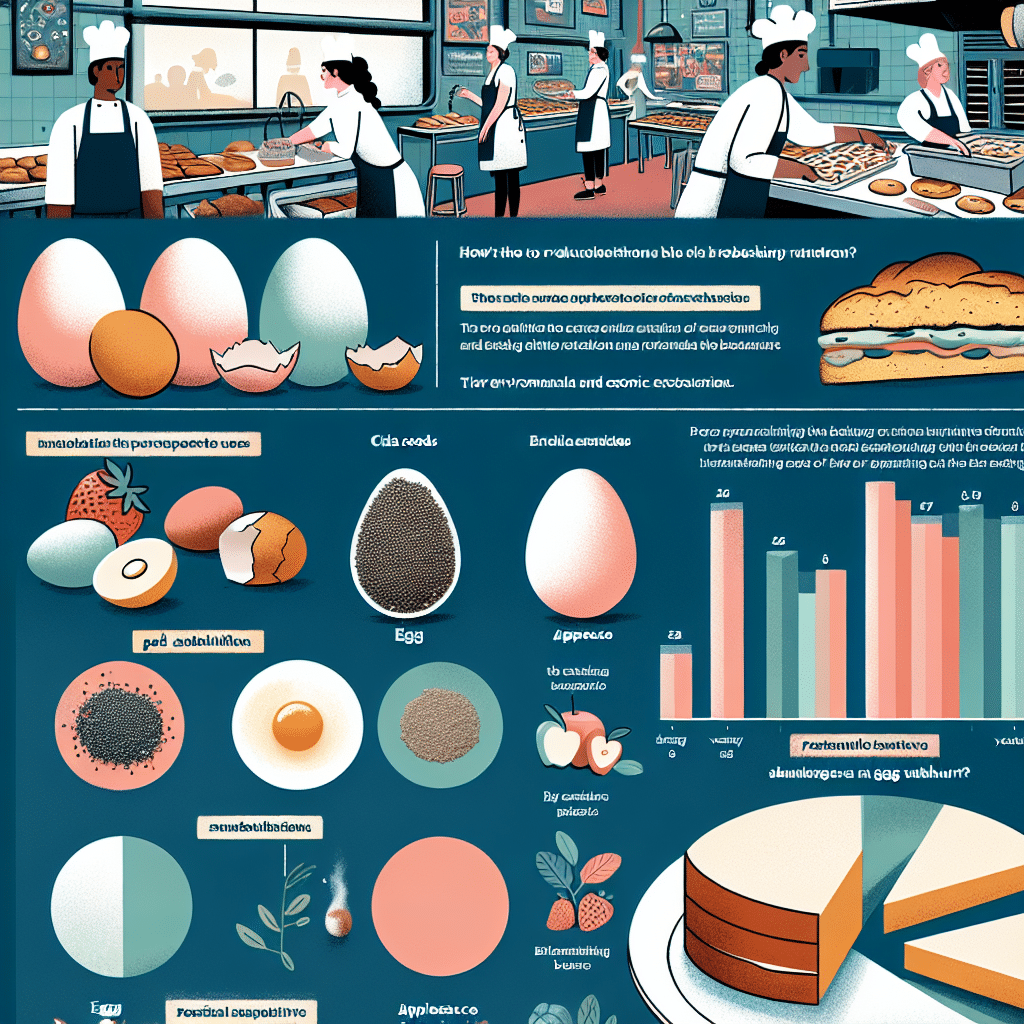Egg Reduction in Bakery: Challenges and Strategies
-
Table of Contents
- Egg Reduction in Bakery: Navigating Challenges with Innovative Strategies
- Understanding the Role of Eggs in Baking
- Challenges of Reducing Eggs in Bakery Products
- Strategies for Successful Egg Reduction
- Utilizing Plant-Based Proteins
- Exploring Starches and Gums
- Incorporating Dairy or Dairy Alternatives
- Leveraging Leavening Agents
- Experimenting with Fruit Purees
- Case Studies and Success Stories
- Impact on the Industry and Consumer Perceptions
- Conclusion: Embracing Egg-Free Innovation
- Discover ETprotein’s Plant-Based Protein Solutions
Egg Reduction in Bakery: Navigating Challenges with Innovative Strategies

Eggs have long been a staple ingredient in baking, providing structure, leavening, color, and flavor to a variety of products. However, recent trends in consumer preferences, dietary restrictions, and supply chain issues have led to an increased interest in reducing or eliminating eggs in bakery products. This article explores the challenges associated with egg reduction in the bakery industry and outlines strategies for overcoming these obstacles.
Understanding the Role of Eggs in Baking
Eggs play multiple roles in baking, which makes them a challenging ingredient to replace. They contribute to:
- Structure: Eggs provide strength and stability to baked goods.
- Leavening: They help baked goods rise and achieve a light texture.
- Moisture: Eggs add moisture, which is crucial for the texture of the final product.
- Emulsification: Eggs help blend ingredients that typically don’t mix well, like oil and water.
- Flavor and Color: They contribute to the rich taste and golden-brown color of baked items.
Challenges of Reducing Eggs in Bakery Products
Reducing or eliminating eggs from bakery products presents several challenges:
- Finding suitable substitutes that replicate the multifunctional properties of eggs.
- Maintaining product quality, including taste, texture, and appearance.
- Ensuring the substitute ingredients are cost-effective and readily available.
- Adapting recipes and processing methods to accommodate new ingredients.
- Addressing consumer expectations for products that are both egg-free and delicious.
Strategies for Successful Egg Reduction
Bakers and food scientists have developed various strategies to reduce egg content in baked goods:
Utilizing Plant-Based Proteins
Plant-based proteins such as soy, pea, and chickpea can mimic the binding and emulsifying properties of eggs. These proteins also contribute to the nutritional profile of the product.
Exploring Starches and Gums
Starches and gums like xanthan gum, guar gum, and modified starches can provide structure and moisture retention, helping to replace the functional properties of eggs.
Incorporating Dairy or Dairy Alternatives
Dairy products like yogurt or dairy-free alternatives such as almond or soy milk can be used to add moisture and richness to recipes that traditionally rely on eggs.
Leveraging Leavening Agents
Baking soda and baking powder can be used to replicate the leavening effects of eggs, ensuring that baked goods rise properly.
Experimenting with Fruit Purees
Fruit purees from bananas, applesauce, or pumpkin can act as binders and add natural sweetness and moisture to baked goods.
Case Studies and Success Stories
Many bakeries and food companies have successfully reduced egg content in their products. For instance, a popular vegan bakery chain has replaced eggs with a blend of starches and plant-based proteins, resulting in a line of cakes and cookies that are indistinguishable from their egg-containing counterparts. Another example is a large-scale manufacturer that developed an egg-free muffin by using a combination of fruit purees and leavening agents, which not only met consumer demand for egg-free options but also reduced production costs.
Impact on the Industry and Consumer Perceptions
The move towards egg reduction has had a significant impact on the bakery industry. It has driven innovation in ingredient sourcing and recipe development, and it has also influenced consumer perceptions. Many consumers now view egg-free bakery products as healthier and more sustainable options, aligning with the growing demand for plant-based and allergen-free foods.
Conclusion: Embracing Egg-Free Innovation
The challenge of reducing eggs in bakery products is complex, but it also presents an opportunity for innovation. By exploring alternative ingredients and adapting recipes, bakers can create delicious, high-quality baked goods that cater to a wider range of dietary needs and preferences. The key to success lies in understanding the multifaceted role of eggs in baking and finding the right combination of substitutes that maintain the desired qualities of the final product.
Discover ETprotein’s Plant-Based Protein Solutions
For bakeries looking to reduce or eliminate eggs in their products, ETprotein offers a range of high-quality plant-based proteins that can serve as effective alternatives. Their organic rice protein, pea protein, and other seed-based proteins provide the necessary binding, emulsifying, and nutritional properties needed to create successful egg-free baked goods. With ETprotein’s products, bakeries can confidently meet the growing demand for egg-free options without compromising on taste or quality.
About ETprotein:
ETprotein, a reputable protein and L-(+)-Ergothioneine (EGT) Chinese factory manufacturer and supplier, is renowned for producing, stocking, exporting, and delivering the highest quality organic bulk vegan proteins and L-(+)-Ergothioneine. They include Organic rice protein, clear rice protein, pea protein, clear pea protein, watermelon seed protein, pumpkin seed protein, sunflower seed protein, mung bean protein, peanut protein, and L-(+)-Ergothioneine EGT Pharmaceutical grade, L-(+)-Ergothioneine EGT food grade, L-(+)-Ergothioneine EGT cosmetic grade, L-(+)-Ergothioneine EGT reference grade and L-(+)-Ergothioneine EGT standard. Their offerings, characterized by a neutral taste, non-GMO, allergen-free attributes, with L-(+)-Ergothioneine purity over 98%, 99%, cater to a diverse range of industries. They serve nutraceutical, pharmaceutical, cosmeceutical, veterinary, as well as food and beverage finished product distributors, traders, and manufacturers across Europe, USA, Canada, Australia, Thailand, Japan, Korea, Brazil, and Chile, among others.
ETprotein specialization includes exporting and delivering tailor-made protein powder and finished nutritional supplements. Their extensive product range covers sectors like Food and Beverage, Sports Nutrition, Weight Management, Dietary Supplements, Health and Wellness Products, and Infant Formula, ensuring comprehensive solutions to meet all your protein needs.
As a trusted company by leading global food and beverage brands and Fortune 500 companies, ETprotein reinforces China’s reputation in the global arena. For more information or to sample their products, please contact them and email sales(at)ETprotein.com today.












